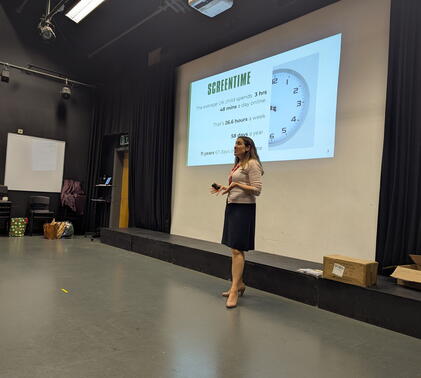
On Wednesday, 12 February, we were delighted to welcome Dr Susie Davies, founder of PAPAYA (Parents Against Phone Addiction in Young Adolescents) and author of 'The Healthy Selfie', to Sidcot. During the day, she ran workshops with students in Years 7, 8, and 9 about the impact of phone use and screen time on their well-being.
Dr Davies shared compelling evidence on how excessive screen time can affect young people's mental health, highlighting the risks of social media and phone addiction. She explained how tech companies design apps to keep users hooked by drip-feeding dopamine through likes and followers, making it harder to put our phones down.
Students received practical strategies to reduce their phone use, including setting boundaries and taking regular breaks from social media. Cutting screen time by 30 minutes daily equates to over one and a half years over a lifetime. The session sparked thoughtful discussion and encouraged students to reflect on their screen habits, empowering them to take more control over their digital lives. Year 8 student Chloe commented:
"At the PAPAYA talk, I learned many things about my screen time. One of these things is how much time my screen takes away from my life. I also learned about how social media can impact a person's mental health, with an average of people having media-related depression. Remembering that people only post the 'best' versions of themselves can help you realise it's okay to be you."
After school, Dr Davies spoke to parents about how they can best support their children's use of technology. She discussed recent studies into the links between depression in young people and the amount of time spent on smartphones, highlighting key statistics on cyberbullying, average screen time for 12-year-olds (26.6 hours per week), loneliness and poor self-esteem.
She shared impactful tips for parents to implement at home, including keeping phones downstairs overnight, helping children reduce their screen time, turning off notifications, and regularly reviewing the apps on children's phones to assess how apps are serving them, whether they are making them happy, and whether they have access to have a positive purpose.
We want to thank Susie for sharing such vital messages with our students and parents and for equipping them with the practical tools to make positive changes to their use of smartphones and technology.


